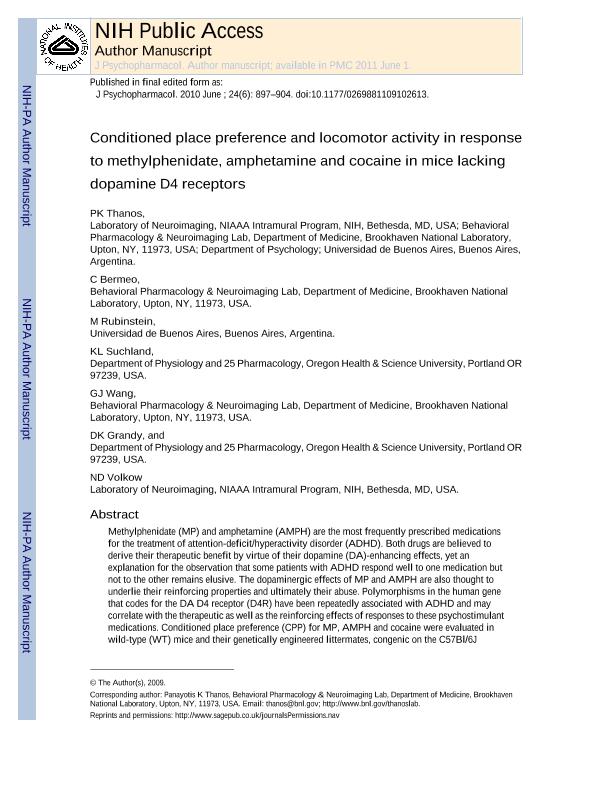Artículo
Conditioned place preference and locomotor activity in response to methylphenidate, amphetamine and cocaine in mice lacking dopamine D4 receptors
Thanos, P. K.; Bermeo, C.; Rubinstein, Marcelo ; Suchland, K. L.; Wang, G. J.; Grandy, David K.; Volkow, N. D.
; Suchland, K. L.; Wang, G. J.; Grandy, David K.; Volkow, N. D.
 ; Suchland, K. L.; Wang, G. J.; Grandy, David K.; Volkow, N. D.
; Suchland, K. L.; Wang, G. J.; Grandy, David K.; Volkow, N. D.
Fecha de publicación:
06/2010
Editorial:
Sage Publications Ltd
Revista:
Journal Of Psychopharmacology
ISSN:
0269-8811
Idioma:
Inglés
Tipo de recurso:
Artículo publicado
Clasificación temática:
Resumen
Methylphenidate (MP) and amphetamine (AMPH) are the most frequently prescribed medications for the treatment of attention-deficit/hyperactivity disorder (ADHD). Both drugs are believed to derive their therapeutic benefit by virtue of their dopamine (DA)-enhancing effects, yet an explanation for the observation that some patients with ADHD respond well to one medication but not to the other remains elusive. The dopaminergic effects of MP and AMPH are also thought to underlie their reinforcing properties and ultimately their abuse. Polymorphisms in the human gene that codes for the DA D4 receptor (D4R) have been repeatedly associated with ADHD and may correlate with the therapeutic as well as the reinforcing effects of responses to these psychostimulant medications. Conditioned place preference (CPP) for MP, AMPH and cocaine were evaluated in wild-type (WT) mice and their genetically engineered littermates, congenic on the C57Bl/6J background, that completely lack D4Rs (knockout or KO). In addition, the locomotor activity in these mice during the conditioning phase of CPP was tested in the CPP chambers. D4 receptor KO and WT mice showed CPP and increased locomotor activity in response to each of the three psychostimulants tested. D4R differentially modulates the CPP responses to MP, AMPH and cocaine. While the D4R genotype affected CPP responses to MP (high dose only) and AMPH (low dose only) it had no effects on cocaine. Inasmuch as CPP is considered an indicator of sensitivity to reinforcing responses to drugs these data suggest a significant but limited role of D4Rs in modulating conditioning responses to MP and AMPH. In the locomotor test, D4 receptor KO mice displayed attenuated increases in AMPH-induced locomotor activity whereas responses to cocaine and MP did not differ. These results suggest distinct mechanisms for D4 receptor modulation of the reinforcing (perhaps via attenuating dopaminergic signalling) and locomotor properties of these stimulant drugs. Thus, individuals with D4 receptor polymorphisms might show enhanced reinforcing responses to MP and AMPH and attenuated locomotor response to AMPH.
Palabras clave:
Addiction
,
Environment
,
Learning
,
Novelty
,
Psychostimulants
,
Substance Abuse
Archivos asociados
Licencia
Identificadores
Colecciones
Articulos(INGEBI)
Articulos de INST.DE INVEST.EN ING.GENETICA Y BIOL.MOLECULAR "DR. HECTOR N TORRES"
Articulos de INST.DE INVEST.EN ING.GENETICA Y BIOL.MOLECULAR "DR. HECTOR N TORRES"
Citación
Thanos, P. K.; Bermeo, C.; Rubinstein, Marcelo; Suchland, K. L.; Wang, G. J.; et al.; Conditioned place preference and locomotor activity in response to methylphenidate, amphetamine and cocaine in mice lacking dopamine D4 receptors; Sage Publications Ltd; Journal Of Psychopharmacology; 24; 6; 6-2010; 897-904
Compartir
Altmétricas



